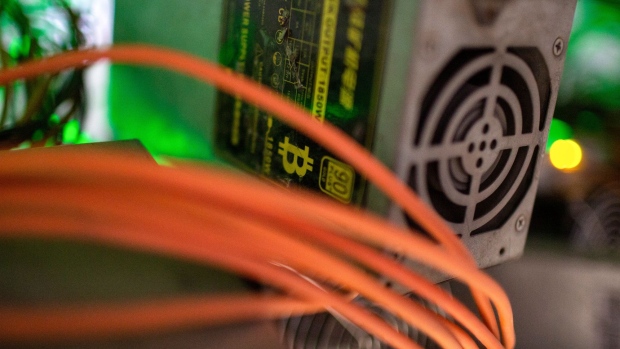May 19, 2021
Crypto Exchanges Break (Again), Showing Fragile Market Not Fixed
, Bloomberg News

(Bloomberg) -- It’s been a rough two weeks in the crypto world, where as much as $1 trillion in market value has evaporated. Wednesday may be the worst of it, as the world’s two largest digital asset exchanges, Binance and Coinbase Global Inc., suffered service outages, sending Bitcoin falling the most since 2013.
Exchanges are central components to the digital asset world, yet they frequently go down when traffic on blockchain networks gets too high, calling into question their readiness to serve a quickly growing market. At the height of the last bull market in 2017 both Coinbase and Binance often shut users out of their accounts due to internal problems. Blockchain and crypto believers like to think they’re changing the world yet the backbone of the industry is clearly not ready for prime time.
Many traders in crypto use borrowed money to boost their returns, which leaves them vulnerable to having their positions automatically sold if prices drop. In the last 24 hours, more than 775,000 traders have had their account liquidated, equal to $8.6 billion worth of crypto, according to Bybt.com data.
“Coinbase always goes down,” said Jon West, the former head trader at digital asset brokerage Omega One who now works for the blockchain firm RChain. While it was disappointing to see the two largest exchanges break, West said this is the best they’ve ever performed when looking back at 2018 or 2019.
“It should be illegal how bad they’ve been” in the past, he said. An email to Coinbase for comment wasn’t immediately returned.
The trouble Wednesday began when Binance, the world’s biggest cryptocurrency exchange, temporarily disabled Ethereum withdrawals citing network congestion. Then Coinbase said it was investigating “intermittent downtime” on its platform.
Binance is looking to fix its issues in the coming months, Brian Brooks, chief executive officer of Binance US said in a Bloomberg Television interview.
“We have way to many customer support issues on backlog,” he said. “I know it’s a big deal, I’ve gotten that feedback,” Brooks said. “We’re all over this and you’re going to see a different customer experience very shortly.”
The two firms are suffering disruptions as cryptocurrencies tumble. Bitcoin plunged as much as 31% to around $30,000. That wiped out more than $500 billion in value from the token’s peak market value before the token partially rebounded from the lows.
Later in the day, Coinbase said it had resolved its issue. As of about 3 p.m. New York time, Bitcoin was down 11% to $38,400 while Ether had plunged 23% to $2,618.
It’s a remarkable turnaround for the world’s two largest cryptocurrencies. Earlier this month Bitcoin was up as much as 500% over the preceding 12-month period, while Ethereum was up an astounding 1,500%.
“It’s definitely a bad experience for people who are used to their traditional brokerage account,” said Aubrey Strobel, head of communications at Lolli, a Bitcoin rewards company. Centralized markets like Binance and Coinbase are how newcomers enter the crypto market, she said.
“It feels like it should be better, especially at Coinbase,” she said. “It’s kind of funny, it’s a forced hodling by these exchanges because you can’t sell,” said Strobel, using the crypto slang “hodl” that began on a message board as a drunken misspelling of hold.
The fact remains that a key point that has brought so many people into crypto plagues the exchanges -- they are a central point of failure that often go down when markets get choppy. That was a key reason Bitcoin and the cryptocurrencies that followed it were embraced -- they have no central point of failure because the blockchains they are built upon are distributed on thousands of computers spread all around the globe.
The exchanges are also less transparent when it comes to explaining to users what’s happening behind the scenes when things go wrong. When West was asked about what exactly was wrong at Coinbase and Binance he said, “I don’t have a clue.” And that’s the problem.
“That’s the story of centralized exchanges,” West said. A new type of market known as decentralized exchanges have become popular in the past year in part because they are not run by a company like Coinbase or Binance. Instead, they match buyers and sellers using smart contracts -- computer programs -- in a peer-to-peer system.
West said he thought this latest exchange outage would only lead to more decentralized exchange adoption.
“That’s why people are so into decentralized exchanges,” he said. “This can’t happen. Only the network gets clogged.”
He also noted that brokerages and markets like the New York Stock Exchange have had very public and embarrassing outages. Earlier this year Robinhood suffered a devastating loss of confidence when it shut its users out of their GameStop positions.
“TD Ameritrade and Schwab go down all the time when markets are volatile,” West said.
Back in the crypto world, West said he was doing his best to manage his investments.
“Today is a day of survival,” he said.
©2021 Bloomberg L.P.





